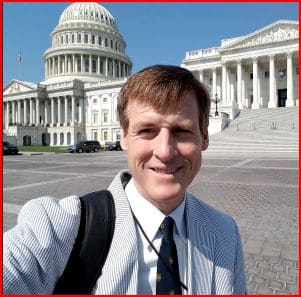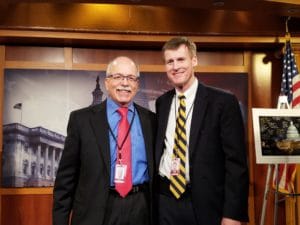
The answer is Dupree does not know. What the veteran Cox Media Group news reporter does know is that he can no longer speak, and that’s tough for someone who’s been on the radio for over 30 years with no plans to slow down. While on vacation with his family in 2016 Dupree got sick and eventually lost his voice. We spoke to Dupree about how he’s doing, his love for covering politics and being on the radio and what he plans to do from here.
Radio Ink: How, why and when did you get into radio?
Jamie Dupree: When I got to college at the University of Florida in 1981, my goal was to get into Radio/TV and do sports. I always liked play-by-play. My first job was doing a jazz music show from 1-5 am, two nights a week. One of my nights was Saturday, so I would put on a long record and go back to the wire machine and read the college football scores like I was doing a show. One time, the urgent bells started going off wildly to signify a major breaking story. It was the bombing of the US Marine barracks in Lebanon. I went on the air with that, woke up the news director at home (it must have been 3:30 am or so), and from there I moved into news. I also liked politics, so I figured the two of those could fit together. I got more experience at UF in radio by the time I had graduated than most people had in a couple of years in the real world.
Radio Ink: What was your big break along the way and who was your biggest mentor in the business?
Jamie Dupree: My big break was getting this job at Cox, which I have had for 29 years. After college, I came back to DC, worked for two local radio stations in the Maryland suburbs, and then went to work on Capitol Hill for a freelance radio news bureau. Half of the job was gathering news, half was cold calling stations in the US and Canada to sell it. That taught me a lot. Then I quit that job in 1988, and freelanced on my own for a little while. The break came when the Cox job came open, and I got it, right at Christmas. Andy Cassells was the Cox DC bureau chief, and his decision to hire me changed my life. I was almost dead broke at the time, and was going to just give up on news entirely. I showed Andy that I could do the job, and he turned me loose, letting me determine how best to serve our stations, and how to cover the news. He also sent me on the road to cover the campaigns, which provided me invaluable experience. It was a lot more difficult in 1992 to find phones that took a “voice-act” to file my reports.
My biggest mentor? I would mention two names. My main influence at the University of Florida was a former ABC and local news TV reporter named Dr. Charles Burke. He urged me to stick with the blend of politics and news, and go back to DC after I graduated in May 1985. He liked radio a lot, encouraged me to try to freelance, and more. In my senior year, he gave me the name of one of his former students when he taught at Missouri, who was working in radio in DC. That was John Bisney, who was a DC correspondent for RKO and CNN Radio for many years. John and I met for lunch over my 1984 Christmas break; he offered me guidance along the way, and then we ended up working near each other for many years in the US Capitol.
Radio Ink: What is the most fun for you about the job?
Jamie Dupree: The most fun about the job is just watching the natural ebb and flow of stories and politics. I know it’s hard to believe for the listener, but I achieved political Zen many years ago, and don’t get worked up about who is right and who is wrong. My job is to cover Congress and DC, and try to lift the curtain so that people can understand what in the devil is going on there. And I love the constant shuffle of people. There are always newly elected lawmakers to meet. I’ve been lucky enough to cover entire careers of some members, and watch their own personal evolution. And I love going to work every day at the US Capitol.
Radio Ink: Washington is nuts these days. Why do you love covering politics?
Jamie Dupree: I like it because it is very important. I also like the historical aspect of it, because too often each party is trying to pull the wool over the eyes of the voters, and convince them that the other side is doing something terrible that’s never been done before. I read a bunch of biographies of Presidents, and focused mainly on their relations with Congress. It was a reminder that we have always had scandals and affairs and major political brouhahas – but most of them are long forgotten. So, I try not to get too worked up about things. Even today. And the Congress is the best beat in the world. There are people to talk to in the hallways all the time. If you don’t want to interview lawmakers, there are protesters and groups doing lobbying days all over Capitol Hill. It’s a great place for news.
Radio Ink: It’s clear you are very well respected by the people you cover. That’s not easy for the press these days. What’s your secret?
Jamie Dupree: I am an old school type. I’m happy to admit it. I’m not into sensationalizing. I’m not into hype. I have long believed that we should put the facts on the table, and let the listeners decide from there. I give you the basics, and you figure it out. So many listeners have told me over the years that they don’t want a reporter telling them HOW to think. I’m not a fan of gotcha questions, but I will have my facts ready. Especially as I did longer-form segments on talk radio, starting with Neal Boortz, then Herman Cain, and Sean Hannity, I found that I needed to do a lot of homework. So, I have done that for years. I know the bills, I know the details, I know the conspiracy theories and can knock them down.
As for the lawmakers. If I need to be a pain, I can be a pain. When Newt Gingrich was Speaker, my main station is in Atlanta (WSB), and so I pestered Gingrich about a $300,000 ethics penalty, and how he was going to pay that back. The network TV producers didn’t want to alienate the Speaker’s press team, so then I asked at each photo op and news conference about the money – and invariably they would end things right there. While confrontation doesn’t always get you a good story, I’m not their PR firm either. If you win the trust of the people you cover, they will deliver for you later on. Also, I tend to focus only on lawmakers, and not their staffs. I don’t need to ask permission to interview anyone. And that’s been my main way of covering the Congress since 1986.
Radio Ink: What are your thoughts on the radio industry today?
Jamie Dupree: It’s tough out there for many. It’s certainly not the same as it was when I broke into the business in 1983. But I still hear a lot of good local radio programs. I’m a big believer in local content. Years ago, my company owned KFI in Los Angeles. I was there one time for a staff meeting, and they made it a point to offer pretty much anyone in the building the opportunity to host an hour live on the air during the weekends (this was back in the early 1990’s). Then, if giant breaking news occurred, they could always be live and local, instead of bringing their AM drive guy in to work all day and all night, or just switch on syndicated programming.

Radio Ink: What are your thoughts on how radio covers news?
Jamie Dupree: This is the old timer in me (at age 54) speaking – I don’t like how we now quote everything that other news organizations report. I don’t get that. If I’m a CBS affiliate and I’m quoting CNN, I don’t get that. I still think there is a place for radio news, both local and national.
Radio Ink: Do you think young kids can break into the business these days and ever have a chance to do something similar to what you do now?
Jamie Dupree: I see it on Capitol Hill. We have more radio reporters now than in a number of years. And with all of the websites out there looking for content, there is a distinct opportunity for people to use radio news-type skills as well.
Radio Ink: What advice do you have for them?
Jamie Dupree: Don’t give up. You know how I got my first job? I called a tiny radio station outside of DC to ask about work, and a few minutes earlier, the news guy had quit and walked out. I was on the air the next morning with a job. Now, that was after months and months of dead ends and frustration – but you can do it.
Radio Ink: What happened to your voice?
Jamie Dupree: I don’t know what happened to my voice. Just this morning, I was going back through stories that I had done on the 2016 campaign trail. A few weeks later, I was off the air. Why? My many doctors don’t know. I got sick on a family trip at Easter of 2016, and my voice went downhill from there. It’s not a question of not being on the radio, I can barely talk, period. Something is wrong between my brain and my larynx/vocal cords/tongue, and so I’m the radio news guy who can’t talk.
Radio Ink: How are you able to continue what you do without a voice?
Jamie Dupree: Obviously, since I have been with Cox for 29 years, I have a little bit of goodwill that was banked over the years. Our radio stations are still promoting my coverage of Washington and Capitol Hill, my blogs run on their websites (as well as our TV stations and company owned newspapers) and I still spend my days getting sound and interviews for our stations, so they can use that in their news programming. I’m doing the same things as before, but I’m not on the radio or TV. My hope is that someday I will be back on the air. I’ve got three kids, 8, 11 and 13 – it’s not exactly the right time for a lack of job security.
Radio Ink: How is your health today and is there a possibility you can get your voice back?
Jamie Dupree: My overall health is fine. We’re just trying to find my voice. One hope is that I might be able to find some kind of voice software, which would allow me to generate taped reports, using old, previously recorded stories. I have 5 years of on air Q&A’s, reporter Q’s and stories that could form the basis on a ‘voice bank’ for that, but we haven’t been able to find the right fit. I just got a tip from a listener today on something that could work, but everything always seems to have a catch, or it just doesn’t do what we need.
I love radio. Yes, we are still like WKRP in Cincinnati in many ways. The characters are still there at all the stations. But it is a great business to be involved with. I wish it were more stable, but that’s what we have at this point.
Reach out to Jaimie Dupree by e-mail at [email protected]





